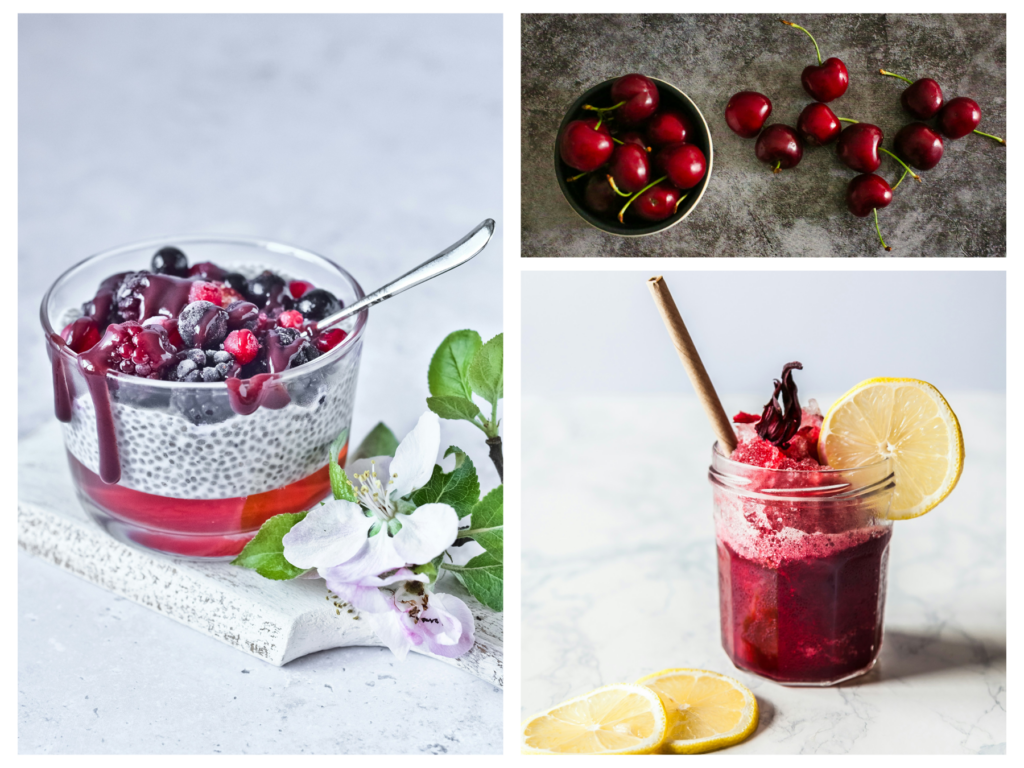Superfoods for Endurance Athletes: Unlocking Performance-Boosting Nutrients

Superfoods are all the hype these days, and in many regards, for good reason! The Miriam-Webster Dictionary defines superfoods as: “a food (such as salmon, broccoli, or blueberries) that is rich in compounds (such as antioxidants, fiber, or fatty acids) considered beneficial to a person’s health.” It is often used in marketing to call attention to a particular food and influence consumers to purchase more of their product. Put succinctly, a superfood defines any food that is dense with beneficial nutrients for you specifically. Let’s dive into 4 superfoods for endurance athletes to focus on.
Tart Cherry Juice
Tart cherries have a high concentration of polyphenolic compounds, nutrients that have antioxidant and anti-inflammatory effects. Endurance athletes typically have a higher amount of oxidative stress and inflammation to recover from, particularly after a hard/intense effort. Eating foods with high amounts of antioxidants can help an athlete lessen the amount of oxidative stress and inflammation in their body.
Tart cherry juice specifically has been shown to improve muscle soreness, sleep quality, perception of pain, and direct performance as well. While there is need for more research to make concrete recommendations, the evidence that is available suggests tart cherry juice to be a low-risk addition for athletes seeking benefits in recovery, pain management & performance.
Whole cherries do carry a benefit, but athletes would need to consume upwards of 50 cherries to match the volume of polyphenolic compounds found in a glass of tart cherry juice. As a note, powdered tart cherry juice has had similarly beneficial effects as tart cherry juice in its original form.
Tart cherry juice is most likely to be best used in “peak performance” stages of training. Chronic supplementation during the base and building phases of training may blunt the training adaptations needed in order to build strength, speed, and endurance. However, during a taper or between two high level races in a season, tart cherry juice is a helpful tool to drive recovery during those periods of time.
From available research, a general suggestion is to drink 1 oz of tart cherry juice concentrate (mixed into 8-12 oz of water) twice a day for at least four days before, the day of, and two days after your race or event.
Beetroot Juice
Beetroot juice is one of the best food sources of nitrates. Nitrates are converted into nitric oxide in the body. An increase in nitric oxide makes it easier for your body to transport oxygen to the muscles, heart, and lungs during endurance exercise. This subsequently improves blood flow, oxygen flow, glucose uptake, and muscle contraction/relaxation: all beneficial outcomes for endurance athletes.
One study tested the specific performance effects of 15 days of beetroot juice supplementation on a group of 12 elite distance runners. The runners who supplemented their diet with beetroot juice improved their time to exhaustion on a treadmill test and lowered their rate of perceived exertion at different running paces when compared to the group of runners who were given a placebo. These findings are consistent with results from other studies.
The general consensus is that beetroot juice is a safe short-term supplement for endurance athletes to try & may improve the athlete’s ability to tolerate high-intensity exercise for a longer period of time. When supplementing with beet juice in the 6-7 days before your main event, drink 13-16 oz of beet juice daily 1 ½ hours before each workout & race. It takes about 2-3 hours for nitrates to peak in the bloodstream, so the timing of your intake does matter.
ADVERTISEMENT

Vitamin C-Rich Foods
Vitamin C is a beneficial nutrient for endurance athletes for a few main reasons. First, vitamin C improves iron absorption. Iron carries oxygen in our bloodstream and provides our muscles, heart, and lungs with the necessary oxygen to perform well as endurance athletes. Our body doesn’t absorb iron very readily, particularly from plant-based food sources. However, pairing iron-rich foods with a vitamin C-rich food will improve our body’s ability to absorb iron. One example of this pairing could be a spinach salad drizzled in citrus dressing or steak tacos stuffed with grilled bell pepper strips.
Secondly, vitamin C may help reduce the intensity and duration of cold symptoms (specifically when it comes to upper respiratory tract infections). Some studies have even found that vitamin C has a modest effect on preventing respiratory infections from developing. The less you get sick as an athlete, the more consistent you are able to train, and the better you will be able to perform.
Thirdly, vitamin C acts as an antioxidant, meaning that it helps reduce inflammation and improve tissue recovery. While supplementing with excessive amounts of vitamin C can actually blunt your body’s ability to obtain necessary training adaptations, assuring adequate intake through food sources is beneficial for endurance athletes’ overall recovery & performance.
Many fruits and vegetables are great sources of vitamin C including kiwis, bell peppers, oranges, strawberries, broccoli, and brussels sprouts.
Chia Seeds
Chia seeds are a commonly cited “superfood” for many reasons. Three top reasons are their omega-3 fatty acid content, fiber content, and protein content. Omega-3 fatty acids are an essential fat, meaning that our bodies cannot produce it on its own. We have to get it from the food we eat. Omega-3’s are not typically found in our most common foods, but rather in fatty fish (like salmon and tuna) as well as flaxseed and chia seeds. High doses of omega-3 fatty acids are particularly helpful in regards to preventing injuries and reducing injury-related inflammation for athletes. One study recommends supplementing with 1000 mg/day of omega-3 fatty acids on a chronic basis in order to prevent injury, and 5000 mg/day for the first 2 weeks at the onset of an injury.
Fiber and protein are both helpful nutrients for increasing satisfaction following meals. Both slow down digestion of carbohydrates. This can help provide a more steady supply of energy during the day when you aren’t exercising. Fiber specifically can help manage optimal cholesterol levels and improve gut health. Protein specifically aids in muscle & tendon recovery. This plays a vital role in helping an athlete obtain a training adaptation following a hard session.
While there aren’t many studies to say chia seeds specifically have beneficial effects on endurance athletes, we know that they are packed with nutrients that do in fact provide a benefit. Including chia seeds regularly in your diet can’t hurt. Easy ways to include chia seeds include: sprinkling oatmeal, yogurt, or toast with some chia seeds, making a chia pudding, or using a chia gel in place of some butter or oil in a baked good.
Superfoods for Endurance Athletes: Unlocking Performance-Boosting Nutrients
Superfoods for endurance athletes are any kind of food that will provide a benefit to the athlete’s health or performance. While not an exhaustive list of foods to focus on, these examples are four areas of superfoods for endurance athletes to focus on. Tart cherry and beetroot juices provide more of a short-term benefit to performance. These can be used in the week or two before a main race. Vitamin C-rich foods and chia seeds carry benefits that are helpful at all times of training. Incorporate them regularly into your diet.
References
- Vitale KC, Hueglin S, Broad E. Tart Cherry Juice in Athletes: A Literature Review and Commentary. Curr Sports Med Rep. 2017 Jul/Aug;16(4):230-239. doi: 10.1249/JSR.0000000000000385. PMID: 28696985.
- Premont R, Reynolds J, Zhang R, Stamler J. Role of Nitric Oxide Carried by Hemoglobin in Cardiovascular Physiology: Developments on a Three-Gas Respiratory Cycle. 2019 Oct; 126(1):129-158. doi: 10.1161/CIRCRESAHA.119.315626.
- Domínguez R, Cuenca E, Maté-Muñoz JL, et al. Effects of Beetroot Juice Supplementation on Cardiorespiratory Endurance in Athletes. A Systematic Review. Nutrients. 2017;9(1):43. Published 2017 Jan 6. doi:10.3390/nu9010043
- Food sources of nitrates and nitrites: the physiologic context for potential health benefits1-3 – Scientific Figure on ResearchGate. Available from: https://www.researchgate.net/figure/Classification-of-vegetables-according-to-nitrate-content-1_tbl2_24424692 [accessed 15 Mar, 2023]
- Zamani H, de Joode MEJR, Hossein IJ, Henckens NFT, Guggeis MA, Berends JE, de Kok TMCM, van Breda SGJ. The benefits and risks of beetroot juice consumption: a systematic review. Crit Rev Food Sci Nutr. 2021;61(5):788-804. doi: 10.1080/10408398.2020.1746629. Epub 2020 Apr 15. PMID: 32292042.
- Balsalobre-Fernandez C, Romero-Moraleda B, Cupeiro R, et al. The effects of beetroot juice supplementation on exercise economy, rating of perceived exertion and running mechanics in elite distance runners: A double-blinded, randomized study. 2018. https://doi.org/10.1371/journal.pone.0200517
- Abioye A, Bromage S, Fawzi W. Effect of micronutrient supplements on influenza and other respiratory tract infections among adults: a systematic review and meta-analysis. BMJ Global Health. 2020.
- Paulsen G, Cumming K, Holden G, et al. Vitamin C and E supplementation hampers cellular adaptation to endurance training in humans: a double-blind, randomized, controlled trial. J Physiol. 2014 Apr 15; 592(Pt 8): 1887–1901. Published online 2014 Mar 12. doi: 10.1113/jphysiol.2013.267419.
- Close, G. L., Sale, C., Baar, K., & Bermon, S. (2019). Nutrition for the Prevention and Treatment of Injuries in Track and Field Athletes, International Journal of Sport Nutrition and Exercise Metabolism, 29(2), 189-197. Retrieved May 12, 2022, from https://journals.humankinetics.com/view/journals/ijsnem/29/2/article-p189.xml
ADVERTISEMENT

Jackie Hendrickson RD, MPH is a registered dietitian with a Masters Degree in public health nutrition from Utah State University. Jackie is the owner of Enduura Nutrition and loves coaching her athletes to their athletic potential through sustainable training & nutrition principles. She is an avid road & trail marathoner with a background in collegiate track, cross country, and competitive swimming. Jackie and her husband, Adam, were teammates in college and continue to pursue their running goals together. They live in beautiful Ogden, Utah with their 2 year old son, Lincoln.









